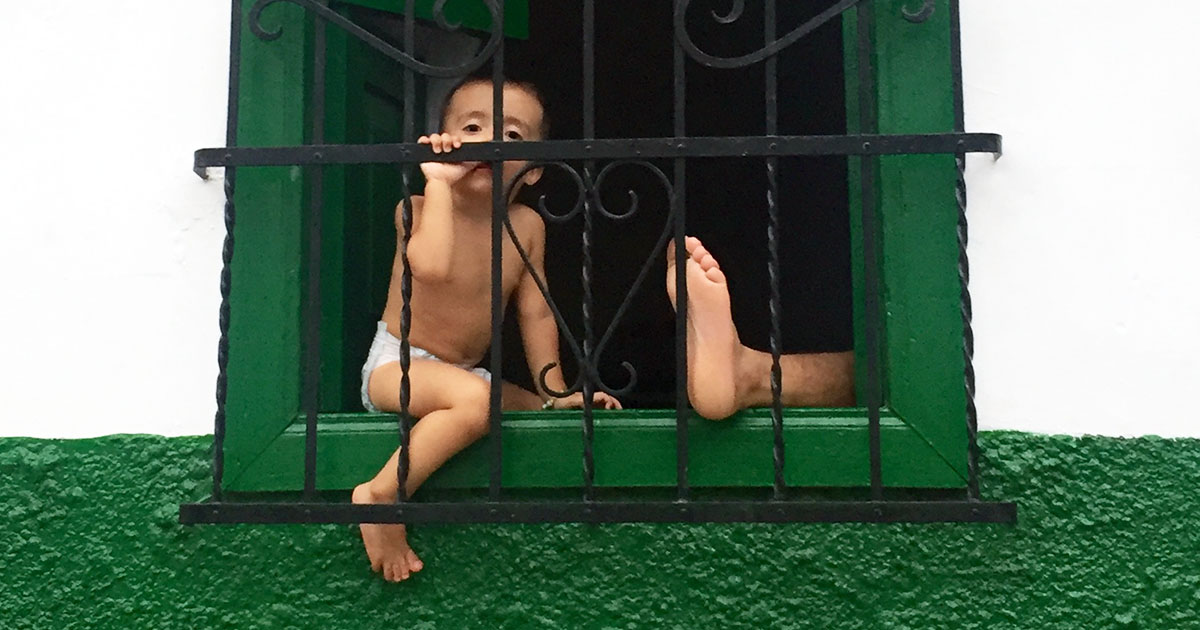ARTIST-IN-RESIDENCE
★ ★ ★ ★
EMER MARTIN

Photo by Emer Martin
‘Resort’
Every year we are lucky enough to take our two kids, Tyler and Sydney, on a beach vacation. A luxury I never had when I was a kid. Kimberly came from a middle-class comfortable background in Palo Alto and we live in the house in which she was raised, otherwise I doubt we could afford to live here. We both work hard for our money.
This year we watched with horror on the news about black people being shot by the police. We tried to shield our kids from all the ugliness and raise them to be colorblind. Sydney is only 12 and she is very sensitive. Her best friend is a brown-skinned Indian girl called Sunita, whose parents came to this country with nothing but their PhDs. They are proof that the American Dream is alive and kicking, even for people of color. I told Sydney that she doesn’t have anything to worry about, our people didn’t own slaves, and we weren’t in the Klan, we didn’t kill Indians. My father was a Russian Jew who came to this country in the 1930s with $100 in his pocket. I was raised in a small apartment and had to pull myself up by the bootstraps. I know what struggle is.
We have been going to Hawaii for ten years and decided to be very adventurous and try Acapulco, Mexico. I don’t speak Spanish and my wife Kimberly speaks only enough to talk to the cleaning lady. Our friends were horrified, “Mexico? You’ll be kidnapped! Murdered! What about the drug gangs?” We were a little apprehensive, but Kimberly was determined.
“Honestly, they all have Mexican cleaning ladies, and gardeners and child minders. They should know that the Mexicans are family-minded people, not very ambitious, but they can’t all be violent.”
There was a bus waiting at Acapulco airport to take us to the Fairmont Hotel and Resort. We were reassured and a little alarmed to see men with machine guns standing at the resort’s gates. The resort had high walls with bougainvillea growing up them and barbed wire lacing the top. We raced down to the complex of pools and slides; there were spas, game rooms, and arts and crafts shops. All the amenities of the Hawaii resorts at a fraction of the price. We spent the first night eating in the romantic Italian restaurant with torches lit and a wonderful singer strumming on a guitar. The stars were dizzy over the ocean. We held hands and our kids groaned at us.
The service was impeccable at the hotel. The staff attended to our every need with graciousness and perfect English. They obviously enjoyed their work. In the morning we got loungers by the beach. A handsome young man came around with a spray bottle and sprayed us all with cold water when the heat was getting too much. We didn’t feel too cut off from the locals. Kimberly marveled at my bravery when I bought peanuts with chili from local vendors who weaved in and out of our beach chairs.
On the third day we felt so comfortable we gave into Sydney’s demands to get her hair braided by a local woman who had pestered us every time we came to the beach. The woman was tiny, 4ft 5, and she had the round flat face of the indigenous people here. It was hard to tell how old these people are. Her hair was jet black and tied in a long single braid.
Kimberly was at the spa and my son was jet skiing, so I sat sipping a Coco Loco and watched as the woman’s dark stubby fingers wove my daughter’s blond hair into braids. I could see poor Sydney wince a few times, but she was stoic and too polite to complain. Women learn early to suffer for beauty, I teased her. The woman’s face suddenly lit up when she heard we were Californians.
“But my son he went to California.”
“That’s wonderful, we have many Mexicans in California.” I was on my second Coco Loco, each time giving the umbrellas to Sydney to adorn her sand castles.
“I never hear from him. Sir.”
“That’s boys for you.”
“No he was a good boy. He is gone for one year. We paid a man 3000 to get him to California.”
“Oh, he was illegal?” Where would this woman have got money like that?
“He was a good boy. He was 17 years old. Sir if I give you a photo can you ask up there where he is? We never hear. My brother in San Jose was waiting for him. He never came.”
She had stopped braiding and Sydney was looking intently at me.
“Every night I dream he is stuck in a pipe, and I can’t get to him, but he can see me. A big pipe. Very dark and dirty and he stand in water.”
Sydney put her hand up to her head to check if the ordeal was over. I stood to look towards the sea to see when Tyler would be finished on the jet ski. Evening was coming down and we needed to head back in to get ready for dinner. We had booked the cultural showcase of Mexican dances that night. I hoped it was going to be authentic and not some cheesy touristy event like those Hawaiian luaus.
The woman was finishing Sydney’s hair with tears rolling downs her brown, wide cheeks.
“Tomorrow I’ll bring photo. You’ll be here?”
“Of course. We’re not leaving till Saturday.”
“You are a kind man. A good man. Sir do you think he is dead?”
I waved at the staff for the check, what was taking them so long? Everything, is Mañana with these people. The woman didn’t seem to want to leave us even when she was finished. She stroked Sydney’s cheek and said, “Que guapa!” Finally, he showed up and we made our way quickly back to the hotel. Poor Sydney squeezed my hand tightly. For the rest of the week we stayed at the pool and didn’t venture to the beach again.

Emer Martin is an Irish novelist, painter and filmmaker who has also lived in Paris, London, the Middle East, and the United States. Her first novel, Breakfast in Babylon won Book of the Year at the 1996 Listowel Writers’ Week. More Bread Or I’ll Appear, her second novel, was published internationally in 1999. Baby Zero was published in March 2007 and released internationally through the publishing co-operative Rawmeash based in the Bay Area California. Why is the Moon following Me? is her first children’s book.
She studied painting in New York and graduated from the Thomas Hunter Honors Program of Hunter College as class valedictorian in January 1998. She had two sell-out solo shows of her paintings at the Origin Gallery in Harcourt St, Dublin. She recently completed her third short film Unaccompanied. She produced Irvine Welsh’s directorial debut NUTS in 2007. She was awarded the Guggenheim Fellowship in 2000. Her new children’s book The Pooka will be released this Halloween 2016. Her fourth novel The Cruelty Men will be released in Ireland and the UK in 2017. She now lives in Palo Alto, California.
Liliana Resnick explores tensions between the inner world of human beings and the exterior world that encloses them. She works in narrative, documentary and experimental style and often mixes them all. Liliana holds an MFA in Cinema from San Francisco State University, and BA in philosophy and comparative literature from University of Zagreb. Her films are shown at many festivals around the world (www.cyclofilm.com).

FOR MORE ON THE WORK OF EMER MARTIN























